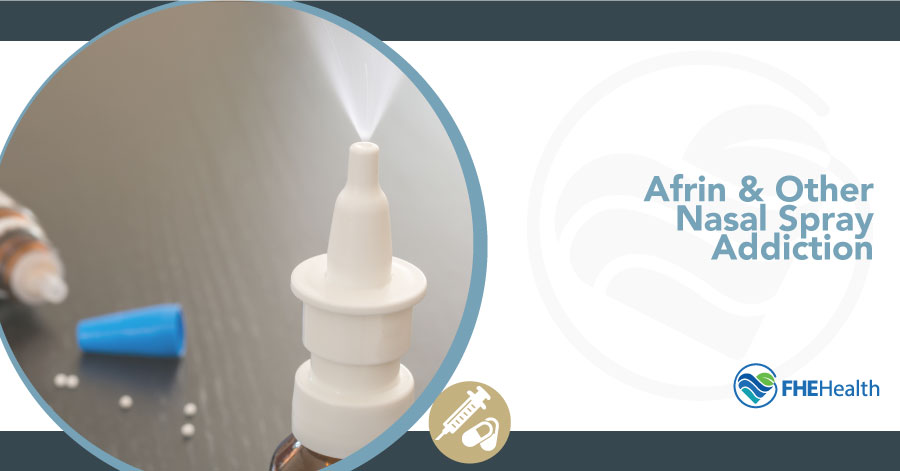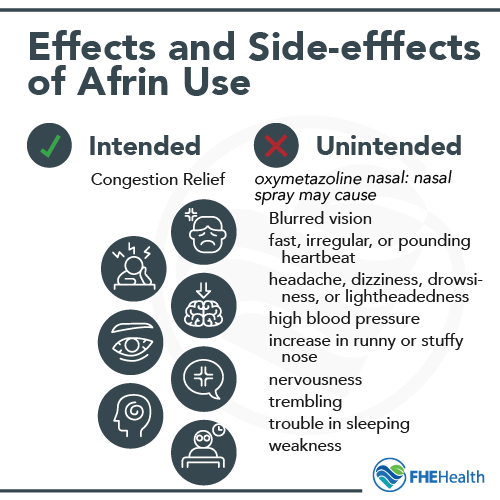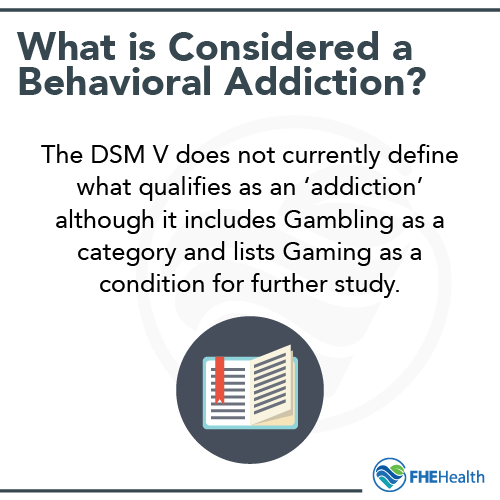
Some people with chronic sinus problems become dependent on nasal sprays like Afrin, which offers short-term relief from congestion and other symptoms of hay fever and the common cold. Afrin is one of a number of nasal sprays that can have different active ingredients and thus be more or less habit-forming, depending on the active ingredient.
Afrin is also the #1 “best nasal spray,” according to a list of “6 Best Nasal Sprays” from U.S. News & World Report—even when its active ingredient, oxymetazoline, comes with more risks of physical dependence. What many people don’t know is that Afrin dependency is associated with certain adverse side effects. If left unaddressed, they can become more severe. A person may continue to use Afrin thinking that it is relieving their underlying problem, when in fact, over time, the medication is only making their problem worse.
With more information, individuals and communities can learn to use Afrin and other nasal sprays safely. In the sections that follow, you’ll learn more about Afrin, its intended purpose and how it works, the signs and symptoms of Afrin abuse, its “addictive” nature and what that means, and the health risks and side effects of Afrin abuse.
Understanding Afrin
What is Afrin? What is it used for, and how does it work? Answers to these questions are key to understanding the drug.
Definition and Purpose of Afrin Nasal Spray
Afrin is a popular nasal spray used to temporarily relieve nasal congestion due to colds, allergies and sinusitis. Afrin contains water and a chemical called oxymetazoline, a topical decongestant exerting vasoconstricting properties. Vasoconstricting agents cause narrowing of blood vessels and capillaries. Spraying Afrin into your nose immediately produces constriction of blood vessels in the nasal passages, which reduces swelling of nasal tissues and congestion.
The drug comes in the form of a nasal spray and a mist formulation. Most people use it by spraying it into the nostrils.
Mechanism of Action and Intended Usage
The active ingredient in Afrin, oxymetazoline, is a vasoconstricting agent. When oxymetazoline is sprayed into the nose, it causes narrowing of nasal blood vessels, which results in a temporary improvement in nasal swelling and congestion. Oxymetazoline is also an ingredient in some prescription eye drops for droopy eyelids and is also present in certain topical facial creams used to treat rosacea.
How Afrin Works Compared to Other Decongestants
While Afrin uses oxymetazoline to relieve congestion, other brand-name decongestant nasal sprays like 4-Way and Neo-Synephrine use phenylephrine hydrochloride, another vasoconstricting agent that decreases swelling and congestion.
Since both oxymetazoline and phenylephrine hydrochloride are vasoconstrictors, the difference between Afrin and other nasal decongestants is minimal to none. Some people simply prefer using Afrin over other nasal sprays, and vice versa, for various reasons such as price, effectiveness and availability.
Afrin Abuse: Definition and Scope
What do we mean when we talk about “Afrin abuse,” and just how prevalent is it?
Afrin Abuse vs. Proper Usage
Afrin is only intended for short-term use. In fact, the directions specify that it should not be taken for longer than three days. Two to three sprays can be applied to each nostril once or twice daily. Afrin “abuse” occurs when a person is spraying the drug into their nostrils more than two to three times a day and/or keeps using the drug over a longer period.
Statistics and Prevalence of Afrin Abuse
Precise statistics are elusive. However, of the roughly 50 million Americans who have long-term sinus problems, as many as 10 million may be affected by Afrin abuse, according to physicians’ estimates, as reported by an article in Medical News Today.
Causes of Afrin Abuse
What psychological and other factors might contribute to Afrin abuse? It can be as simple as a misconception that more of a good thing (a nasal spray that reduces congestion) will lead to better results (in the form of even less congestion). When this is the expectation, the process itself—spraying Afrin into one’s nostrils—can become somewhat addictive.
Signs and Symptoms of Afrin Abuse
Physical Signs of Afrin Abuse: “The Rebound Effect”
“Rhinitis medicamentosa” is the clinical term for rebound congestion, which is a primary physical sign of Afrin abuse. It occurs as the result of excessive and lengthy use of Afrin. This rebound effect has given rise to the erroneous belief that you can become addicted to Afrin.
Afrin-caused rebound congestion is not a form of addiction. Instead, suffering recurring nasal congestion due to overuse of Afrin is a physiological reaction involving tolerance of nasal passage tissues to oxymetazoline. The nasal spray rebound effect has no psychological component. People don’t crave Afrin the way they would a chemically dependent drug like opiates. The only thing that compels them to keep using Afrin is that they cannot breathe normally through their nose without repeatedly spraying oxymetazoline onto nasal passage tissues.
Other Side Effects of Afrin Abuse
 Afrin users rarely report allergic side effects. However, temporary side effects are common, especially if too much Afrin is sprayed into nostrils. Possible side effects of Afrin use include:
Afrin users rarely report allergic side effects. However, temporary side effects are common, especially if too much Afrin is sprayed into nostrils. Possible side effects of Afrin use include:
- Stinging and burning of nasal passage tissues
- Runny nose
- Sneezing due to irritation (sneezing stops after irritation diminishes)
Many people who use Afrin for over a week or more experience these side effects when Afrin starts wearing off and sinus tissues begin swelling again–the rebound effect. Within seconds of using Afrin, these side effects usually disappear.
Behavioral Indicators of Afrin Abuse
The main behavioral indicator of Afrin abuse is overuse of the nasal spray. If a person compulsively uses it, they are not taking it as directed and are prone to the rebound effect.
Health Risks Associated with Afrin Abuse
Short-Term Health Consequences of Afrin Misuse
Afrin misuse in the short term can cause a person to feel more congested. This sensation can lead to more misuse of Afrin, only perpetuating the problem.
Long-Term Risks and Complications of Afrin “Addiction”
Terminology is important in a discussion of “Afrin abuse,” as opposed to “Afrin addiction.” These two terms can sometimes be used interchangeably. When referring to Afrin, though, “Afrin abuse” is the appropriate term. In fact, by definition, the term “addiction” can be misleading in reference to Afrin use and abuse.
 Consider the following definition of addiction from the American Society of Addiction Medicine:
Consider the following definition of addiction from the American Society of Addiction Medicine:
Substance addiction is a chronic, treatable medical disease that involves complex interactions among genetics, chemicals in the brain, a person’s environment and a person’s life experiences. People with a drug addiction engage in compulsive behaviors that continue despite the person suffering harmful consequences as a result of their drug-seeking behaviors.
The ASAM further states that “treatment approaches and prevention efforts put forth by local and federal agencies are typically as successful as approaches and efforts used to treat chronic medical diseases.”
The rebound effect caused by Afrin overuse is not an addiction to nasal sprays. Rebound congestion that occurs when you stop using Afrin doesn’t require professional intervention by experienced addiction counselors. Nor does it require medical detoxification to rid the body of harmful drugs. Also, rebound congestion is not a medical disease involving the brain. Finally, people compelled to use Afrin on a daily basis don’t engage in behaviors that severely compromise their jobs, relationships and general health.
Effects of Afrin Abuse on Daily Life
Impact on Work, Relationships, and Overall Quality of Life
While the chemicals contained within Afrin and similar drugs do not create a chemical, physiological dependency in the same way that drug families like opiates and amphetamines do, they can be part of a process addiction behavior. This refers to a behavior that someone is ‘addicted to’, not because of the specific chemicals involved, but the behavior’s psychological stimuli and reward of performing. Gambling addiction, for example, does not involve the introduction of external chemicals but is a system of finely tuned rewards that can create destructive behaviors. Any urge and relief upon completion can be part of this cycle, but some are more prone to abuse than others. This type of behavior sometimes called a process addiction, is an indication that treatment is needed but is only recognized as an official disorder in certain circumstances, such as video games and gambling.
A process addiction can come to negatively impact a person’s daily life in ways that, over time, may affect their work, relationships, and overall health and happiness. Most people can beat a dependence on Afrin on their own. However, with process addictions, many people find they do need the help of an empathetic and experienced therapist or behavioral health professional.
Financial Implications of Afrin Addiction
Excess consumption of Afrin can become expensive. If you find you’re consistently spending money on this nasal spray, that could be a sign of a process addiction or dependency that needs to be addressed.
Afrin Withdrawal and Treatment Options
“Withdrawal” from Afrin thankfully does not entail a neurochemical process of detox from the drug, as it might with drugs that are truly addictive. However, the rebound effect can be challenging.
Symptoms of Afrin Withdrawal
Your ability to stop using Afrin depends on how you can handle several days of a stuffy nose and be unable to breathe normally. Since the rebound effect isn’t an Afrin addiction, you can withdraw from daily use at home safely.
Strategies for Tapering Off Afrin Use
One way to defeat rebound congestion is to simply go cold turkey. Most long-term Afrin users cannot do this because having a stuffy nose 24/7 is just uncomfortable and interferes with eating, sleeping and work tasks. Saline solutions may help ease the side effects of rebound congestion and get you through the worst days.
Saline nasal sprays contain sodium chloride and water that moisturize nasal passages and remove debris such as pollen and dust. Clearing stuffy nasal passages with a saline solution also gets rid of excess mucus to facilitate breathing normally again. Although saline solutions are non-habit-forming and won’t cause a rebound effect, the relief you feel after spraying saline and water onto your nasal passages is a short 30 to 45 minutes. Fortunately, you can use saline nasal sprays as much as you want without harming nasal tissues.
If going cold turkey or using saline solutions doesn’t work, you can try eliminating the rebound effect by working on clearing one nasal passage. In other words, use Afrin on one nasal passage only while letting the other nasal passage remain congested until the rebound effect wears off. After a few days, you should be able to breathe well enough through one side of your nose to either go cold turkey or use saline sprays on the other side of your nose.
Available Treatment Options, Including Therapy and Support Groups
Most people who compulsively use Afrin are able to stop on their own accord. However, if you’re struggling and feel dependent on the drug for relief of your congestion, it may be worth consulting your primary care doctor. They may be able to suggest some nasal spray alternatives that are safer for long-term use. They may also have some other recommendations for resolving your exacerbated congestion.
If you feel addicted to the process of taking Afrin, a therapist may be able to help you address the behavioral roots of the habit. They may help you reframe and replace thoughts that trigger the compulsion to keep using Afrin or cause you to feel dependent on the drug.
Prevention and Intervention
Education about safe Afrin use is an important part of prevention. So are interventions to address Afrin abuse at individual and community levels. If you notice that a friend or loved one is frequently using Afrin over an extended period of time, ask them if they are aware of the health effects.
Is Flonase “Addictive” Like Afrin?
It’s a common question, given how popular Flonase is and that people may be searching for safer alternatives to Afrin. Flonase is a nasal spray prescribed by doctors for relieving symptoms of allergies and sinusitis. Belonging to the corticosteroid class of drugs, Flonase works differently than Afrin. In addition to reducing inflammation, Flonase also blocks the irritating effects of pollen, dust, mold and pet dander. Also, while Afrin starts working immediately to relieve congestion, Flonase users may not feel congestion relief for a few days.
Although Flonase doesn’t cause a rebound effect like Afrin does, long-term use of corticosteroid nasal sprays can promote recurring nosebleeds and headaches.
Professional Help for Real Substance Addictions
Many people entering our rehab center who are addicted to snorting cocaine, crushed opioid pills or methamphetamine have become heavily dependent on Afrin or other nasal sprays containing oxymetazoline or phenylephrine hydrochloride. Snorting drugs is known to gradually destroy nasal passage tissues. Frequent nosebleeds and the development of ulcerations within the nasal passages commonly affect cocaine and meth abusers and intensify the inflammation and swelling of nasal tissues.
FHE Health is a leading substance abuse and mental health treatment facility in Southern Florida that provides personalized care, medical detoxification services and inpatient/outpatient treatment programs to help adolescents and adults regain their physical and psychological health. We also specialize in treating co-occurring disorders involving substance addictions and mental illnesses. Please call us today if you or someone you know has co-occurring substance abuse and mental health disorders.
FAQs About Afrin Addiction
Q: I feel like I need to use Afrin all the time just to breathe, and if I stop, my nose gets worse. Am I actually addicted to it like a street drug?
A: What you’re experiencing is likely rhinitis medicamentosa, or “rebound congestion.” Your nasal tissues have developed a physical tolerance to the medication’s active ingredient, oxymetazoline. While it mimics dependency because you feel compelled to use it for relief, it is not a chemical addiction in the same way as opioids or alcohol. You are not experiencing a neurochemical change, but a physical reaction.
Q: My doctor told me not to use it for more than three days, but I’ve been using it for weeks. What kind of damage am I doing to myself?
A: The main issue is the rebound effect, where the medication actually makes your congestion worse over time. Beyond that, continuous overuse can lead to temporary side effects like stinging, burning, and irritation in the nasal passages.
Q: I can’t seem to stop on my own. It feels like a compulsion, and I get anxious if I don’t have the spray nearby. Do I need rehab for a nasal spray?
A: While detox or drug rehab is typically not required for Afrin misuse, the compulsive urge you describe suggests a process addiction, which is a focus on the behavior and the feeling of relief, rather than a chemical dependency on the drug itself. If this habit is negatively impacting your work, sleep, or peace of mind, an experienced behavioral health professional or therapist can be incredibly helpful in addressing the underlying behavioral roots and replacing the habit with healthier coping mechanisms.
Q: How do I actually get off Afrin?
A: You have options! Some find success going “cold turkey,” managing the congestion with non-habit-forming saline nasal sprays. Another effective strategy is the one-nostril tapering method, where you only use Afrin in one nostril until the other side clears up, and then switch. For many, talking with a primary care doctor is the first step to explore safer, long-term alternatives like a steroid spray (such as Flonase), which works differently and doesn’t cause the rebound effect.
Q: I heard that Flonase is also a nasal spray. Is it going to cause this ‘rebound congestion’ problem too?
A: Flonase (fluticasone) is different from Afrin because it’s a corticosteroid, not a vasoconstrictor. It works by reducing inflammation over time, rather than immediately shrinking blood vessels. Because of this, Flonase does not cause the rebound effect seen with Afrin. It is considered a much safer alternative for chronic, long-term use, though it can take a few days to feel the full effects.
Q: How can I tell the difference between just having a bad cold and actually being dependent on the spray?
A: If you have a bad cold, your congestion should gradually improve over a week or two. If you are experiencing dependency, you will notice that your congestion returns almost immediately after the Afrin wears off, and it often feels worse than the original congestion. If you have to use the spray multiple times a day, every day, just to maintain clear breathing, that’s a strong sign of rhinitis medicamentosa, not just a common cold.






